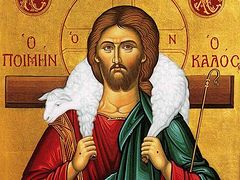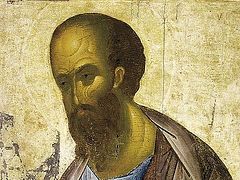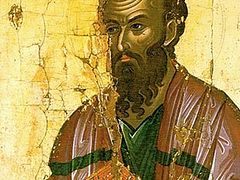From the depths of a Roman prison words of encouragement and instruction from the great Apostle Paul were sent in a series of letters to communities throughout the Roman Empire. St. Paul may have been fettered and shackled by Roman guards, but the word he preached remained unfettered and free.
Today we begin to look at St. Paul’s letter to the Philippians. When we begin to look at St. Paul’s letter to the Philippians, the first thing to notice about it is the postmark, metaphorically speaking; letters didn’t actually come with postmarks in those days, of course. But St. Paul wrote his letter to the Philippians, as he did some other Epistles, from prison in Rome. And he was in prison in Rome because Rome considered he was part of a dangerous, subversive and potentially treasonous movement. The founder of the movement, Jesus of Nazareth, had been executed as a felon, as a dangerous traitor to the Roman state, under Pontius Pilate, by calling Himself the King of the Jews. As far as Rome was concerned, He was setting Himself up as a rival king to Caesar and so He had to be stamped out, and His movement had to be stamped out. The Christians could protest their loyalty to the Christian state all they liked, but that didn’t change the fact, as far as Rome was concerned, that their founder had been executed as a king who was a rival to Caesar. And indeed, when you looked at the Christian movement, it seemed to be a dangerous sort of thing. Wherever the Apostles would go, riots would be attending them. When they were coming to one of the cities, people would say, “Ah, these men who have turned the world upside down have come here!” So it seemed as if the Christian movement was a dangerous movement, and that’s why Paul was in prison in Rome—he was imprisoned because he was the ringleader of a sect that was politically dangerous.
So, that’s the first thing. It’s kind of ironic that the Christian Church has come to be the embodiment of respectability, because in the early days it was the embodiment of something very unrespectable. If you were a Christian, you were aligning yourself with a group that was universally hated; you wouldn’t want your daughter to date a Christian, you wouldn’t want to have anything to do with all of those horrible Christians. They were very unrespectable indeed. So the question for us as we begin to read a letter that was written from the slammer, as it were, is, “Are we prepared to forfeit our respectability for Jesus Christ?” That’s the challenge. Because St. Paul’s letter comes from prison, we have to say we are reading the work of a jailbird as it were, as far as the Romans were concerned. Are we prepared to forfeit our respectability by identifying ourselves with this movement? As I said, now it doesn’t matter, you can read the Epistles of St. Paul and people think that you’re quite wonderful and respectable and religious and all sorts of things. But are we willing to be thought unrespectable for the sake of Jesus Christ? If we are going to be his servants and soldiers and disciples, we have to be willing to give up everything for him: our life, our career and our popularity as well. Paul writes to us from prison. That postmark challenges us to be willing to forfeit everything that we have for Jesus Christ.
So, let us begin reading this letter from prison. St. Paul writes: Paul and Timothy, bondservants of Christ Jesus, to all the saints in Christ Jesus who are in Philippi, including the bishops and deacons: Grace to you and peace from God our Father and the Lord Jesus Christ (Phil 1:1-2).
Of course all ancient letters began this way. You would say who you are and who you were writing to, and then you would say, “greetings”. “Fr. Lawrence to the people at, say, Conciliar Press: greetings”. That’s how you would begin. Or you would begin, “Joe, to his family back at home: greetings”. That’s how they could have all begun, that was the basic format. St. Paul, overflowing with the love of God and enthusiasm for the Gospel, always builds theology into all of his greetings, and some of them go on for some time. But here, this is the basic formal greeting with which you would open any Epistle, and I’d like to unpack that greeting just a bit.
Paul begins by saying not just “Paul”, but “Paul and Timothy”. Timothy wasn’t in prison with him of course, but you get the idea that he was visiting St. Paul in prison at the time and St. Paul therefore included him in his authorship of the letter out of a sense of generosity. Everything that was in St. Paul’s letter to the Philippians was of course written by Paul and not by Timothy, but Paul was not nervous about his own popularity, was not nervous about his own authority. He was the spirit of the Gospel, he was willing to share the stage as it were with his fellow workers; and that’s how Timothy was visiting St. Paul and comforting him and being a part of his ongoing ministry and work, and then being included in the opening salutation. And Paul describes himself, along with Timothy, as bondservants, or slaves of Christ Jesus. The word in the Greek is “doulos” (δοῦλος). Not just a servant, “diakonos” (διάκονος), but a slave. The difference between a servant and a slave of course it that you might work for somebody else as a servant but still be a free man. A doulos, a slave, was someone who belonged utterly to the master, heart and soul; you had no life of your own apart from your service to the master, you had only so much freedom as was allowed to you by the master, you were owned by him. And this is how St. Paul considered himself to be, that Jesus Christ was not his “hobby”. Jesus was his life, he had no life apart from Christ, that’s why he could say: For me, to live is Christ (Phil. 1:21). He had no other life apart from Christ and describes himself as the servant of Christ Jesus.
It’s instructive to see not just how he describes himself, but, in this case, how he doesn’t describe himself. In most of his other Epistles he describes himself as someone who is an Apostle, who had been called by Jesus Christ. If you look for example at his letter to the Roman, he writes: Paul, a bondservant, or a doulos, of Christ Jesus, called as an Apostle, set apart for the Gospel of God (Rom. 1:1).
When he’s writing to the Corinthians: Paul, called as an Apostle of Christ Jesus by the will of God, and Sosthenes, our brother (1 Cor. 1:1).
When he writes again to the Corinthians in 2 Corinthians, he says: Paul, an Apostle of Christ Jesus by the will of God, and Timothy our brother (2 Cor. 1:1).
When he’s writing to the Galatians who are challenging his apostolic authority he really lays it on thick: Paul, an Apostle not sent from men or through the agency of man, but through Jesus Christ and God the Father who raised Him from the dead (Gal. 1:1).
But it seems like he never fails to mention his apostolic authority. But here, he does omit mention of his apostolic authority. He doesn’t have to stress his apostolic authority to the Phillipians; he’s writing to them as his beloved children, he’s writing to them as his beloved friends. He doesn’t need to lay it on thick that he’s an Apostle. He is writing to them not out of the fullness of his authority, but out of the fullness of love. He’s content therefore to describe himself as the slave of Christ Jesus. And he writes to the Philippians and he describes them as the saints in Christ Jesus who are in Philippi. The Christians are called saints. A Christian is a saint, hagios (ἅγιος), that is to say, one who is holy. And it’s an amazing thing to be described as holy, especially when you look at the quality of our lives, because God Himself is the only Holy One. That was the Old Testament designation of God, the “Holy One of Israel”. The angels were originally called “the holy ones”. If you were in the land of Palestine, talking as a Jew and you talked about God and the holy ones, people would think basically that you are talking about the angels. But St. Paul takes this designation, “the holy ones”, and applies it also to the people of God. A Christian is hagios, a holy one, a saint, because he has begun to participate in the divine nature of God; all that God is by nature God shares with His people by grace, so the Christians are saints. As Orthodox of course when we talk about saints we’re usually thinking of the saints with a capitol “S”: St. Peter, or St. Athanasius the Great, or St. John Chrysostom, or of course St. Paul. And those capitol “S” saints are the Christians whom the Church wants to put up on the Ecclesiastical billboard as it were to say look at these people, there is something about the quality of their lives that we want to bring to the attention of the whole Church, we lift them up to be imitated and so that we could ask for their prayers. They have a special significance to all of the Church. Saints with a capitol “S”. So, that’s true and that’s all wonderful.
This later terminology of sanctity shouldn’t rob our exegesis of the fundamental truth that we are all saints with a much smaller “S” than St. Paul and St. Athanasius the Great. We are all equally called to be the children of God; we are all equally called to participate in the Divine nature. This is also the liturgy of the Church when the deacon calls out “Let us attend” and the priest lifts up the Holy Gifts of Christ’s body in the Divine Liturgy and says, “The Holy Things for the Holy”. That’s what he’s saying; he’s saying the Sanctified Things, namely the gifts of Christ’s Body and Blood, for the saints. He is not merely saying the Holy Things of Christ’s Body and Blood are given to only you people out there who are holy and who have had a good week and have behaved yourselves, while you Christians out there who are not holy can step back. No. He is assuming that all of the communicant Christians that are there are the holy people of God, and therefore they receive the Holy Gifts of God. So this is the liturgical usage of the Church—we are all saints in Christ Jesus, whether in Philippi or in Langley or in New York or Las Vegas; wherever you are, you are not just in Philippi or in Langley – you are primarily in Christ Jesus.
So St. Paul talks to all of the saints in Christ Jesus in Philippi and singles out the bishops and deacons, and he was singling out these local groups of clergy because the letter to the Philippians was impart a thank you letter for a monetary gift that he had received that had been sent by one of them, Epaphroditus, and he’s thanking the people that arranged and got up the gifts, namely the bishops and the deacons. And because the terminology for local clergy has changed over the years, we need to say a little bit about bishops and deacons as they were in the first century.
The bishops and the deacons were the two main orders, the two main classifications of Church workers, if you want to put it like that, in the first century. The deacons you kind of know about. They were the people who were set apart by prayer and the laying on of hands to handle the physical aspect of the Church life as a community, they would be the ones who supervise the daily distribution of food such as was held in Jerusalem in the first century, they would be the ones to take care of the Church budgets and run the soup kitchens and all of that sort of thing. They were servants par excellence—the word deacon comes from the Greek word “diakonos” (διάκονος), which just simply means “servant”.
The bishops, “episkopos” (ἐπίσκοπος)… again, terminology has changed a little bit. In the first century Church, wherever Paul went, and the other apostles as well, they would ordain “presviteroi” (πρεσβύτεροι), they would ordain “elders”, presbyters. There would be a plurality of them in the Church of Philippi; you might have, who knows, three or four, five or six presbyters or “elders”, and they were responsible for ruling the Church, they formed a council, almost like a local Sanhedrin as it were, which simply means council. If you had a difficulty in the Church with a brother or a sister, you would bring your complaint to the presbyters. They would decide who would be ordained and make all of the decisions for the local community. They were also called episkopoi (ἐπίσκοποι) or bishops or overseers. The two terms were used interchangeably and synonymously. You can see this when you look at St. Paul’s usage in Acts 20. St. Paul gathers together all of the clergy of the Ephesian Church from Miletus. This is in Acts 20:17. From Miletus Paul sent to Ephesus and called to him the presbyters of the Church, the elders of the Church and addresses them and encourages them, and in verse 28 he says, Be on guard for yourselves and for all the flock among which the Holy Spirit has made you overseers, or bishops, episkopos, to shepherd the Church of God which he purchased with his own blood (Acts 20:28). The point is that St. Paul calls all of the presbyters together and addresses them as bishops. The two terms were of course used interchangeably, so every local church had a number of bishops, it wouldn’t just be one bishop over them; there would be a number of bishops—again, called presbyters as well. One of them of course presided. When they would come together to pray, one must preside even as James, the brother of our Lord, presided over the Church in Jerusalem. As far as we know, in the first century the one who presided didn’t have a special name—he was simply known by his own personal name. They would call all of the presbyters of Jerusalem “the elders and James”; they didn’t have a particular title in the flowchart of authority in the Jerusalem Churches, it was just “James”. But he was the one who would preside liturgically and would be as it were the first among equals. Later, towards the end of the first century, perhaps even later in some places, there was a bit of a terminological shift. When you look at the works of St. Ignatius of Antioch, who died in about 107 AD, you can see that there has been a terminological shift, and he reserves the title “episkopos”, bishop, for the main presider, for the first among them. And so in the terminology of St. Ignatius you had one bishop per local community as the pastor who was assisted in his ruling of the community by a number of presbyters. And there were, of course, the deacons as well.
So by the time of St. Ignatius of Antioch, the term “bishop” no longer applied to all of them together, that title was reserved for the main presbyter, the main bishop, the one who presided over them and became the focal point of unity for them all. But this terminological development lay in the future when St. Paul is writing to the local Church, there is a plurality of episkopoi, a plurality of overseers or bishops and the deacons as well. So St. Paul writes to all of them, Grace to you and peace from God our Father and the Lord Jesus Christ (Phil. 1:2). It’s significant that he says that “grace and peace”, the favor and glory and presence of God flows from God the Father and the Lord Jesus Christ, I would suggest as from one single source. Jesus Christ as the Eternal Son of the Father, as the physical manifestation of the Father, is grouped together with the Father as the single source. It’s not that grace comes from God the Father and peace comes from Jesus Christ or something like this, but rather all that we receive from God: His grace and His peace, His presence, His healing, His forgiveness – all flows from this single source, from God the Father and the Lord Jesus Christ. In this sense Jesus Christ is one with the Father as the Lord said in John’s gospel as well. He said, “I and the Father are one” (John 10:30); “He that hath seen Me hath seen the Father” (John 14:9) Not that He is the Father, but that He is the visible manifestation of the invisible God.
So this is St. Paul’s opening salutation in his letter to the Philippians, Philippians chapter 1, verses 1-2.
Listen to the podcast on Ancient Faith Radio.




